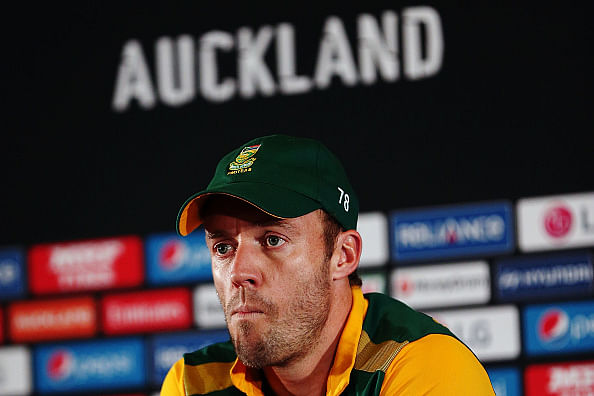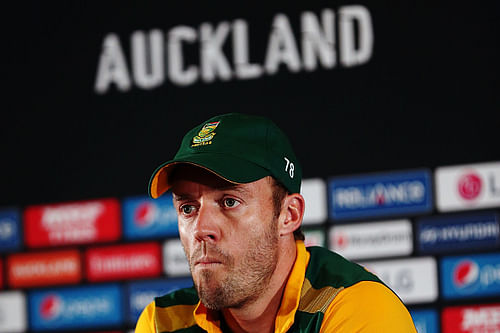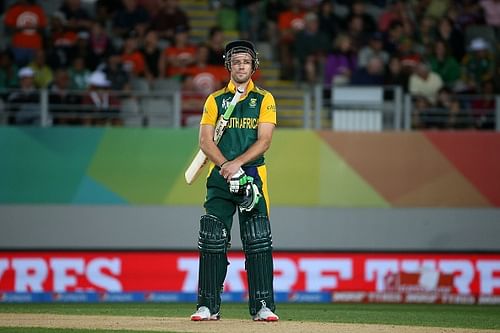
AB de Villiers the captain needs to step up

We are almost into the fourth week of the World Cup, and it has been an absolute privilege to witness some really magical performances from many teams. For some, it has been a remarkable turnaround after a nightmarish run-up to the quadrennial extravaganza of One-Day Internationals, while for another set, it has meant defeat after gut-wrenching defeat. Moreover, when one of the latter set of squads includes one of the pre-tournament favourites as well as the world’s best batsman in the shorter format, you begin to wonder whether they could just survive to fight another day or not.
In such situations, what the side needs is one of those guys who can guide them through troubled waters. Someone who has had experience playing under high pressure, and has been chosen to be at the helm of a team that is known to collapse at inopportune times. But when the mantle of leadership is given to the world’s best, under the assumption that he can engineer a revival in their sliding fortunes, and the results are not quite up to the mark, then it becomes a proverbial case of putting all your eggs in one basket.
Abraham Benjamin de Villiers is feeling that emotion right now. South Africa’s go-to man cut a disconsolate, lonely figure out in the middle as well as at the post-game conference after the Proteas suffered their second defeat of the tournament, to 1992 champions Pakistan. This, despite taking the fight to the opposition, battling the threat of rain and the highly-respected combination of Duckworth and Lewis, and top-scoring in the progress.
A man who saw his teammates fall like ninepins in pursuit of a relatively gettable total by today’s standards can only do so much – he isn’t a superhuman despite being labelled so after numerous exploits. Shades of a certain Sachin Ramesh Tendulkar in the late nineties, perhaps?
But that’s ABD the batsman, the destroyer of even the most potent bowling attack in the world. Yesterday, it wasn’t he who lost to Pakistan; it was ABD the captain and leader who suffered that ignominy.
“Thrown a curve ball before the game started” isn’t a good enough reason
In the mandatory address after the match, the skipper was questioned over some of his rather quirky decisions on the field. Never one to give any excuses, the Pretorian admitted that Vernon Philander’s withdrawal hours before the team went out to play threw him for a loop. The speedster is a more than handy batsman down the order, and can hit the ball a long way; although he was declared fit (having missed a couple of games due to a hamstring strain) and available to play, he had to pull out due to discomfort.
This event certainly upset De Villiers’ stratagem and may have prompted his decision to bring himself on in order to get the fifth bowler’s quota out of the way. The move backfired big time – between him and JP Duminy, they conceded 77 runs, perhaps a dose of the medicine both eagerly dish out with the willows themselves.
Although the captain did defend the rather unorthodox (for lack of a better word) step, it stands to reason that this was definitely perplexing for the spectators as well as the experts sitting up in the commentary box.
Would it not have made sense, then, to drop the struggling Quinton de Kock and don the big gloves once again? Also, despite Wayne Parnell’s profligacy in the match against India, the left-arm seamer could have filled in the void left by Philander’s sudden exit. De Villiers talked about depth in his lineup, yet his decision not to bring Parnell in place of De Kock was baffling.
Rilee Rossouw could have taken the opening slot along with Hashim Amla, and still ABD chose to go ahead with the tried-and-tested left-right combination. Against Pakistan, you need an element of unpredictability: it confuses the living daylights out of them. Sadly in this case, De Villiers the captain was completely flummoxed.
No electric vibe felt – seriously?

This was the silliest of all the things the enigmatic leader said after the defeat. Frankly speaking, it does not send out a motivational signal to the rest of the team members. And coming straight from the man himself, it is bound to at least shock them to the core.
De Villiers has always been forthright with his views, and I admire his ability to tell it like it is. But forthrightness must be tempered with a sprinkling of encouragement and a call to action. This attempt at reverse psychology pays off in only one out of perhaps nine or ten cases.
In Amla, South Africa get the much-needed stability at the top of the order. The fiery duo of Dale Steyn and Morne Morkel, too, have paired up exceedingly well together and bowled their hearts out for their side. Imran Tahir, too, has performed to the best of his abilities with his bag of tricks.
So when De Villiers calls their performances into question, along with those of Du Plessis, Miller and the like, it’s not going to go down well with their motivational aspect.
I don’t mean to insinuate that the team’s No. 1 batsman-cum-fielder-cum-wicket keeper is deriding his mates for not standing up when the chips are down. It is quite the opposite, in fact. But when he talks about vibes, it really reeks of thoughtlessness; nay, careless thinking, on his part. Such statements do not reflect well upon the leader of an international team, a nation that eagerly awaits its first title triumph in the four-year showpiece event.
Captaincy needs two things – a tough mental makeup and tools to execute the plans
Former Indian captain Sourav Ganguly hit the nail on the head when he stated that the job of the skipper is not at all easy. It needs a lot of thought, time and effort. In addition to the usual ingredients of imagination, guts, verve and inventive nature, there are two more things a captain must have: a tough mental makeup, and the requisite tools (players) to execute the plans formed.
De Villiers ticks the first box, but not the second (at least in regards to the Pakistan game). There is nothing more important for a leader than to tune his team to the same scale that he is on. In other words, finding the right player and shaping up the team, with the senior players donning the role of mentors to the younger ones. You do that, and see how the squad functions – they know what to do, they go out and do it with the amount of skill and talent they have. It is an art very few captains seem to have mastered in this edition of the World Cup.
De Villiers did touch upon this fact, but by the time he realised it, it was already too late. He needs to be able to repose his faith in the youngsters, back them at all levels, exhort them to give their best. He isn’t a one-man army, and neither is his side a one-player team, as has been affirmed by coach Russell Domingo and some of the support staff. What he needs to do right now is make some bold yet practical decisions so that his side go into the quarter-finals with a lot less hassle than before.
Buck up, Demolition Man!